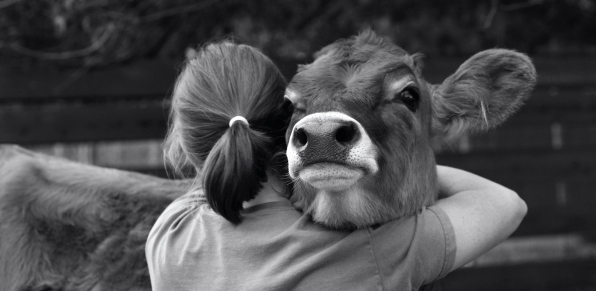Does your worldview include a deep respect for animals and their rights? Do you choose to opt out of using and consuming animal products for ethical reasons? Are you vegetarian or vegan for ethical reasons? If you answered “Yes” to any of these questions, your ethical beliefs are now one step closer to being protected under Ontario human rights law as a form of “creed,” thanks to years of work by Animal Justice.
Ontario’s Human Rights Code protects people from discrimination based on characteristics like race, age, gender identity, and sex in situations like the provision of services, housing, and employment.
People are also protected from discrimination based on their creed. The term “creed” isn’t defined in the legislation, but until recently, it was thought to mean the same thing as religion.
But not anymore. The Ontario Human Rights Commission—a government agency which plays a critical role in promoting and advancing human rights in Ontario—began consultations in 2011 on updating its official policy on creed. One of the key questions considered by the Commission was whether creed should be expanded to include secular, moral, or ethical belief systems that are non-religious in nature. After all, strongly-held secular beliefs like an animal rights ethic can be more important to a person than a religion. And religion is on the decline, with fewer and fewer people saying they hold religious beliefs. If the purpose of human rights law is to protect human dignity, then why shouldn’t the law protect important secular beliefs along with religious ones?
Representatives of Animal Justice mobilized during the consultation process, telling the Commission that secular beliefs like ethical veganism also deserved legal protections as a form of creed.
The Commission listened to us. In December, it finally issued the much-awaited updated policy on preventing discrimination based on creed. Unlike the previous policy, which excluded non-religious belief systems, the new policy states that creed is not limited to religion:
“Creed may also include non-religious belief systems that, like religion, substantially influence a person’s identity, worldview and way of life.”
This would include a belief system that seeks to avoid causing harm to animals, like ethical veganism.
So, what does this all mean? The Commission policy is designed to provide guidance to employers, housing providers, and other service providers on how they can respect human rights and accommodate people who have requirements based on their creed. For example, the policy recommends that a person in a hospital facility who has a creed-based need for vegetarian food be provided with appropriate food by the facility. Other examples include:
- A university or school would have an obligation to accommodate a biology student who refuses to perform an animal dissection because of her creed.
- An employer would have an obligation to accommodate an employee who cannot wear an animal-based component of a uniform, like leather or fur, because of his creed.
- An employer must ensure corporate culture does not exclude a vegetarian or vegan employee, such as holding regular company networking events at a steakhouse, instead of providing additional inclusive opportunities.
The final word on interpreting creed rests with the Human Rights Tribunal of Ontario, which hears and adjudicates human rights claims. But Commission policies are persuasive, if not binding, on the Tribunal. Already, the Tribunal has said it is possible that a “political perspective… made up of a recognizable cohesive belief system or structure” may amount to a creed,[1] which bodes well. The Tribunal has also recognized Chinese meditation and movement practice Falun Gong as a creed, despite its practitioners describing it as a “spiritual cultivation practice” as opposed to a religion.
In 2011, a claim was filed by a Ryerson student who felt the university discriminated against her in her academic studies because of her beliefs about animals and their rights. Although the case was dismissed on other grounds, it’s likely only a matter of time before the Tribunal will be asked to give a final and definitive ruling that ethical veganism is protected by human rights law.
In the meantime, you have the right to file a claim with the Human Rights Tribunal of Ontario if you believe you are facing discrimination based on your beliefs about animals. Animal Justice may be able to assist you. Contact us to learn more about your rights and how to enforce them.
[1] Jazairi v. Ontario (Human Rights Commission), [1997] OJ No 1526
This blog and the contents herein are for informational purposes only and do not constitute legal advice. Readers are advised to seek legal counsel prior to acting on any matters discussed herein. The opinions expressed are those of the author.




